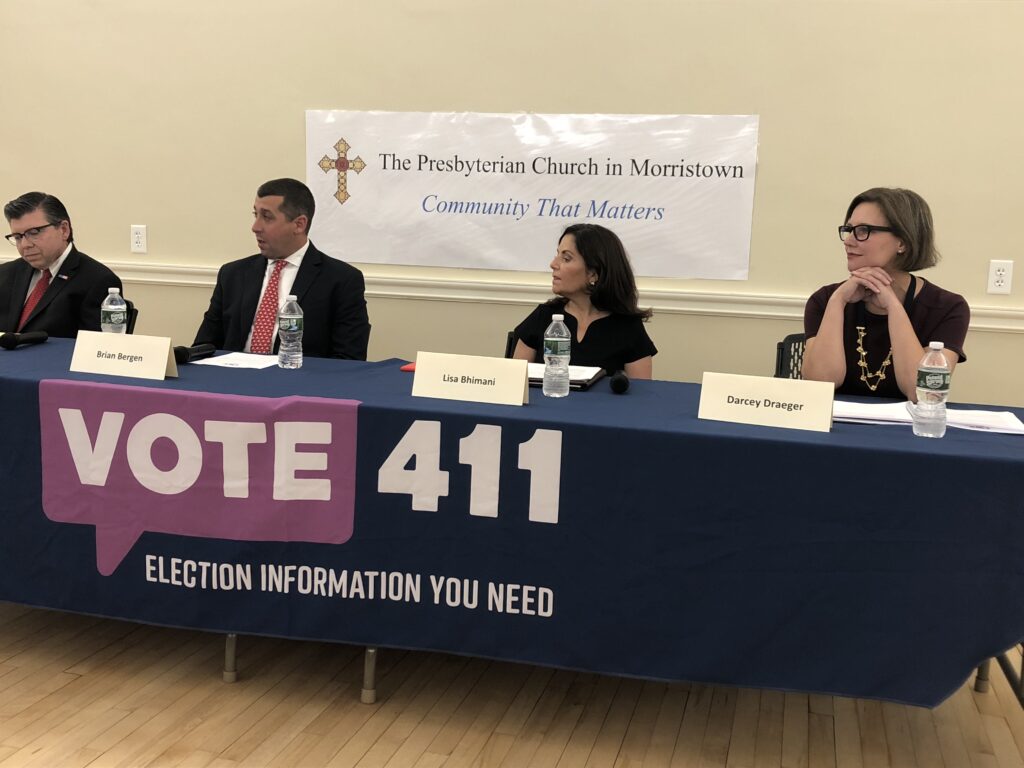Takeaways from an Acrimonious LD25 Debate
Listen to audio version of this article

MORRISTOWN - Brian Bergen was agitated. More than once at Monday's District 25 debate, he asked what his Democratic opponents, Lisa Bhimani and Darcy Draeger, thought about the state budget.
You can see the relevance. The budget, which took effect July 1, was a source of contention for the second year in a row between Gov. Murphy and the Democratic Legislature. So, Bergen wanted to explore where Bhimani and Draeger stood in this internal party battle.
But they avoided the question every time Bergen brought it up.
Asked about it afterwards, Bhimani said she couldn't give an informed opinion about the budget because she wasn't in the Assembly when it was put together, and as such, was unable to fight for district priorities. There is some logic here, but in truth, Democrats running for the Assembly should have an opinion on a state budget passed by their own party.
That was another interesting takeaway from what was an acrimonious debate among Anthony M. Bucco, Bergen, Bhimani and Draeger.
Bucco ended the debate by calling his opponents extreme partisans who would never work across the aisle.
The Republicans, in fact, were playing offense most of the night. Bergen said he was the proverbial average guy, cracking that he doesn't own a Park Avenue penthouse or an estate in Chester.
It is always a bit amusing when Republicans see wealth as a detriment. But let's look at the issue.
Bhimani and her husband do own a residence in Manhattan, which became an issue earlier in the campaign because of a tax abatement granted the property. This is common, but the sticky point was that only permanent residents qualify for such a tax abatement. So if Bhimani was a permanent resident in Manhattan how could she run for office in New Jersey?
On Monday, Bhimani said all this had to do with a "clerical error" by the co-op board and that she fixed the mistake and paid back any improper tax break.
As for the "estate," Draeger and her husband own 11 acres in Chester Township, about 10 acres of which is a farm.
A GOP mailer claimed she paid only about $25 in property taxes because of a farmland assessment. That was not actually true. The mailer "forgot" about the fact she pays about $24,000 (according to tax records) in property taxes on her home, which sits on 1-acre of her property.
As an overview, it's common for farmland assessments to become controversial in political campaigns. The rules are fairly straightforward - if you own at least a 5-acre farm and if you sell at least $1,000 worth of farm products a year, you qualify. And by that measure, Draeger's farm qualifies. She said at the debate that the farm sells honey, fleece and other products.
A more substantive and perennial state issue - property taxes - also produced some enlightening exchanges.
The Republicans' central point was that a fairer school funding formula would bring more state aid to school districts and thus, help reduce what they need to raise in property taxes. This premise assumes school districts would use added state revenue to reduce the tax burden as opposed to spending it on new programs and staff.
Bhimani said the overall problem is that the state has too many towns.
Various attempts have been made over the years to consolidate towns, or at least share services, as a way to reduce property taxes. Most have failed.
Bergen, in fact. pointed out that a proposal to merge two towns in the district, Roxbury and Mount Arlington, is not going well. He's right about that, but the greater point is that truly reducing property taxes is going to take solutions that may seem radical to some - like forcing towns and school districts to merge, although Bhimani said she would oppose mergers compelled by the state. The governor did name two so-called czars to explore and encourage sharing services and the like, but up to now, there has been no public sign of much progress.
Bergen said the state should get out of the way and let local officials handle the problem themselves, The problem with that approach is that many local officials are never going to give up their little fiefdoms unless they're encouraged - or forced - by someone else to do so.
Gov. Murphy recently said a high-tax state like New Jersey may not be the place to be for those who care only about taxes. The candidates were asked what they thought about that?
This was a slam-dunk for Bucco and Bergen, but it also allowed the Dems to challenge the assumption they would be raw partisans in Trenton. Draeger said that if Murphy really believes that, he's destined to be a "one-term governor." Bhimani essentially agreed.
In a general comment about the state and its government, Bucco speculated that if you went outside the debate venue - a Presbyterian Church on South Street - and asked 10 people if New Jersey was moving in the right direction, most would say no.
A cynic may have wondered what the answer would be if you asked 10 people if they plan to vote next week?
Both questions are relevant.





